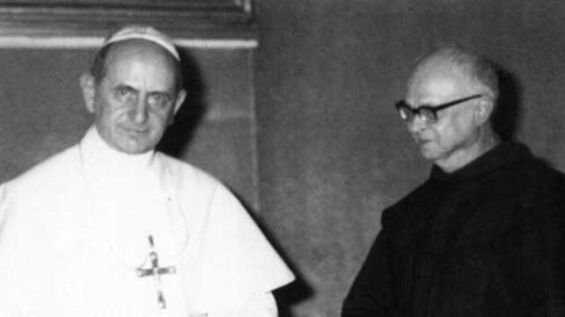He was born into a notable family. His brother, Omar, was one of the founding members and leaders of the Moroccan National Movement and the Istiqlal Party. But Jean Mohamed Ben Abdeljalil, born Mohamed ben Abdeljalil, chose a path quite different from his brother and peers.
A native of Zankat al-Rtall, in Fez, Ben Abdeljalil was born to Muslim parents and accompanied them to Hajj at the age of nine. He also attended the University of al-Qarawiyyin in Fez. However, his name became famous after his conversion to Christianity, specifically Catholicism.
Ben Abdeljalil converted at the age of 20 when he decided to be baptized into the church in 1928, with French Catholic scholar Louis Massignon as his godfather. «This caused quite a shock at the time», wrote La Gazette du Maroc in a May 2008 issue.
His conversion was the result of years of spiritual evolution. He was a graduate of Gouraud High School and resided at the Foucault School run by Franciscan fathers in Rabat.
Years before his conversion, Ben Abdeljalil was one of four young Moroccans appointed in 1922 by French Resident General Marshal Hubert Lyautey as civil servants attached to the Residence. This position allowed him to be sent to France to «learn about French civilization and culture», according to Lyautey.
According to the Dictionnaire des Orientalistes de langue Française, Lyautey provided Ben Abdeljalil with a scholarship to study for a bachelor's degree in literature with a major in Arabic at the Sorbonne, «although it was philosophy that attracted him».
In France, he associated with prominent scholars like French Arabist Gaudefroy-Demombynes and French Orientalist William Marçais. He also pursued philosophical studies at the Institut Catholique, where French Catholic philosopher Jacques Maritain taught.
A controversial conversion
After interacting with these influential figures, the young student announced his conversion in 1928. He was baptized by the Archbishop of Paris, and legend has it that he even received a «missal and rosary from the Pope himself on the occasion of his First Communion». Ben Abdeljalil’s conversion did not go unnoticed, particularly among his fellow Moroccan students in France.
La Gazette du Maroc reported that his godfather, Louis Massignon, faced a boycott from young Moroccan students in France who protested Ben Abdeljalil’s conversion. In Morocco, the reaction was even stronger, especially in his hometown, Fez. The local press at the time wrote that Fez «turned out in full force for the funeral of an apostate Muslim whose empty coffin was buried in a cenotaph».

The young scholar's decision also prompted the Fez bourgeoisie to reject French education in a bid to protect themselves from religious proselytizing. «It was from this that the idea of creating independent schools, funded by the national movement, was born», wrote the same magazine.
The news even caught the attention of the French intelligence services in Morocco, who sent a confidential note to Paris, calling his conversion a «serious act for a Moroccan».
«The act that this young man has just accomplished seems to be the result of a long moral and intellectual evolution, but this evolution was not, it seems, purely spontaneous», reads the note published by La Gazette du Maroc.
«Two years ago, Ben Abdeljalil boarded at the Franciscan Institution 'de Foucauld' in Rabat while attending the Institut des Hautes Études Marocaines. It was through this institution that he lived in Paris in a hotel on rue Sarrette, belonging to the Franciscans».
«From there, he went to live in Viroflay with the family of the director of the Foucauld Institution. But the influence of one of his Parisian teachers, Mr. Massignon, seems to have been decisive above all», reads the same note.
The Moroccan priest who met Pope Paul VI
Despite criticism in his home country, Ben Abdeljalil continued his career, becoming a priest in 1935. He wrote books and contributed to the works of French orientalists. He was even appointed as the successor to French orientalist Baron Carra de Vaux as chair of Arabic at the Catholic Institute.
«He strove to make Islam better known from a missionary perspective. In two important articles published in 1941 in En terre d'Islam, and in 1949, later translated into Spanish, he provided a detailed account of the positions defended by Taha Hussein on the future of culture in Egypt and analyzed the fundamentalist Salafiyya movement», wrote anthropologist François Pouillon.

In 1936, Ben Abdeljalil was appointed as a lecturer at the Institut Catholique in Paris, where he taught «Christians how to get to know Islam better», as noted in Pioneers of Christian-Islamic Dialogue.
In addition to his work in France, Ben Abdeljalil also played a pivotal role in Morocco. According to the book «Un Entrepreneur du National au Maroc. Ahmed Benkirane, Traces et Discrétion» by Bono Irene, Ben Abdeljalil is believed to have helped build relationships between the informal missions of the nationalists and Catholic intellectual circles that supported the independence of Maghreb countries.
Ben Abdeljalil met Pope Paul VI in 1966. However, his conversion led him to break ties with his native environment, and his attempt to settle in Morocco after independence, in accordance with the wishes of his brother Omar, failed. Ben Abdeljalil died on November 24, 1979, at the age of 74, in Villejuif, France.





 chargement...
chargement...












